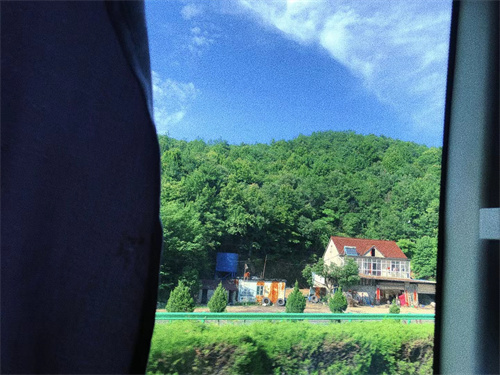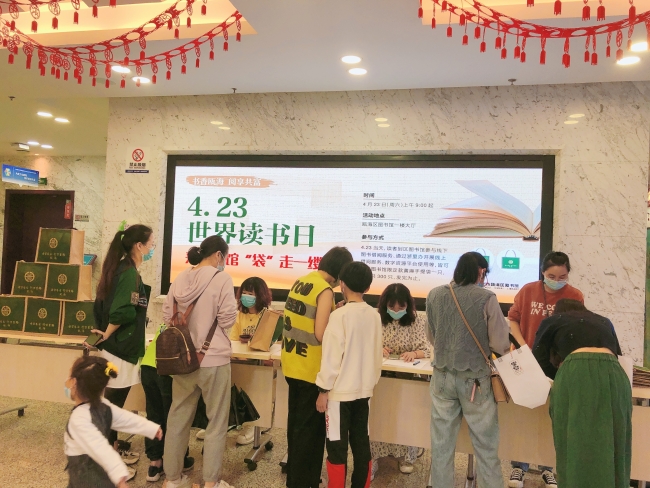A view of Shanghai. Photo:VCG
Editor's Note:At present, the Shanghai epidemic prevention and control battle is at a critical stage. As an international trading and communicating hub with a wide range of cultures, the pause in this cosmopolis has tugged at the heartstrings of the world.Meanwhile, people in Shanghai have shown their unique attitude toward this sudden change in their lives. Be they foreign volunteers who joined the comprehensive anti-epidemic action in local communities, or those who tried to follow recommended protocols with optimism, or people who have continued to live their Shanghai-style lives, the city offers examples of resilience and a determination to fight at every turn.When in Shanghai, do as the Shanghainese do. In the following days, the Global Times will present different stories unfolding during the anti-epidemic battle in Shanghai, to showcase the city's tenderness, optimism, and diversity.During the current COVID-19 outbreak in Shanghai, some foreigners in Shanghai have joined forces with the city to overcome difficulties and lend a hand to the comprehensive anti-epidemic effort as community volunteers, providing practical help as an international force to Shanghai's "dynamic zero" vow.As an important window of China, Shanghai has attracted a large number of foreigners with its cosmopolitan atmosphere. According to data provided by the Shanghai government, currently 215,000 foreigners live and work in Shanghai, accounting for 23.7 percent of the country's total, ranking first in terms of foreign populations in the country.Reporters from the Global Times recently contacted several international volunteers who have offered to help in the fight against the epidemic in Shanghai and listened to their thoughts and stories in the process.They said that the experience of fighting against the epidemic with the people of Shanghai helped them better understand China and love Shanghai even more. In their opinion, they are a part of the city, and it is their duty to defend "Shanghai."'My experience gave a distinct feeling of the bond between comrades during the Long March'
Jacob von Bisterfeld is among a group of volunteers distributing supplies at a community gate. Photo: Courtesy of Lu Yifan
Jacob von Bisterfeld from New Zealand sprangto action as a community volunteer in Shanghai's Songjiang district during the city's lockdown.Now, his typical day begins with ushering residents out of their respective houses to receive a nucleic acid test in his imperfect Putonghua, assisting in testing arrangements, collecting trash from door to door, and delivering supplies with his makeshift airport luggage carriers and a four-wheel push-trolley."He is the very energetic who always rushes to the front over many younger volunteers," Lu Yifan, his neighbor, told the Global Times. "Residents affectionately call the aged expat 'Lao Luo,' as he has given himself the Chinese name Luo Jiangqiang."A video clip of gray-haired Luo bending over to arrange grocery supplies on a rainy day, wearing a thick protective suit and holding an umbrella, has been widely shared and liked online.Luo, a retired professor from Shanghai Jiaotong University, has been living in China for about three decades and has gotten involved in many voluntary projects while in the education sector.Omicron-hit Shanghai falling into unprecedented difficulties makes him feel heart-broken.After Shanghai's lockdown, he was one of the first to sign up as a multilingual volunteer. When receiving his green volunteer vest, Lao Luo felt excited and relieved to finally be able to "give back" to the community, with at least three hours put in every day as a volunteer."What motivates foreigners to volunteer in their adopted country to do important but mostly menial tasks that used to be done for them is an inborn sense of responsibility, the knowledge that essential services might collapse and endanger the lives of the larger community. And that the financial capacity of the government during these enormous calamities is not unlimited," Luo told the Global Times. "Volunteering is also a good way of making friends and getting fully integrated into the local scene.""My experience of working with my comrades gave a distinct feeling of the bond between comrades during the Long March in the 1930s and living in the cave houses of Yan'an. Sometimes, when the rain was pelting down on us on a cold night and we volunteers were filling shopping bags with vegetables I felt as if I was experiencing some of the deprivations of the Long March," said Luo."The camaraderie of a group of volunteers shouldering arduous or menial tasks together, and our team of volunteers have cemented a solid bond among each other and I am happy to be accepted as a comrade," said Luo.Luo believed that time will tell if the "zero-COVID tolerance" course taken by the Chinese government was the best solution."The current short-term discomfort for many and suffering for some will ultimately be of great benefit for the people's wellbeing and the economy. And last but not least, of course, the most important benefit for every one of the 25 million Shanghai residents will be an absolute minimum of fatalities and untimely deaths," Luo said.'Balcony music cheered people up'
Steven Back wearing a protective suit in his compound in Shanghai in early April. Photo: Courtesy of Steven Back
The megacity of 25 million residents has been making efforts to combat the virus and people's sentiments have fluctuated depending on the COVID-19 epidemic situation. Hungarian Steven Back, who has been living in Shanghai for about 18 years, also felt the same as his community was put under closed-loop management.Like many residents living in the city, Back felt surprised in the beginning when the city was put under a citywide "static management." Living in a nice compound with about 5,000 people, Back was quite familiar with some neighbors and became a volunteer two days later after his compound was put under lockdown on April 1.Holding a loudspeaker, he encourages residents to come down and queue up for tests. Even while having to stand for periods of six to nine hours a day in hot weather wearing a protective suit, he still considers it fun. "It was very natural for me to do it," Back told the Global Times, noting that he wanted to help his neighbors to relax and feel less nervous.He was also warned by his volunteer peers that some people may have a very bad temper and would not cooperate. "However, I've never had this situation and everybody is very friendly."Back was also quite proud that his daughter would paint on his "Da Bai" clothes (protective suit) every night with Chinese and Hungarian flags to cheer them up. "It's very showy," he said, believing that it might also be fun for others.As infections rose, some residents began to believe that taking a nucleic test might increase their chances of getting infected and would refuse to cooperate. Despite this, Back would still try his best to cheer his neighbors up and encourage them to be positive and happy.Together with about 40 other neighbors, they held a successful balcony concert to help people relax and elevate their moods. When seeing people dancing, singing, and using electric torches to make a light show, Back felt the great comradery alive and well in his community. "Everybody was having a very good time," Back said, noting that all the work they have done has been well worth it.Through the dynamic zero-COVID policy, "China has been very successful at saving lives and maintaining relatively high productivity compared to other countries," Back said. He also mentioned that in his country, many people chose to receive China-made COVID-19 vaccines as they trusted the products.Back has made an appointment with his new friends who he had met during his volunteer work to go out for a drink once the restrictions are lifted. "We plan to go out and celebrate!"'Shanghai has become my second hometown'
Korean volunteers in Shanghai help transport supplies during lockdown on April 21. Photo: Courtesy of Park Chang-joo
At a residential community in Shanghai's Hongqiao Town, Korean resident Park Chang-joo, who created three WeChat groups for some 1,200 Korean neighbors in early 2020 at the beginning of the COVID-19 outbreak, was busy communicating the latest local anti-epidemic policies, answering questions, and offering helps to Korean residents on WeChat all day amid the current city lockdown.A Putonghua-speaking entrepreneur who has been running a business in Shanghai for decades, Park now serves as an anti-epidemic volunteer in his community, where more than 30 percent of the residents are Korean. Since residents were asked to self-quarantine at home from April 1, each day, Park receives WeChat messages from 30-50 of his Korean neighbors asking for help."How to get a new QR code for a nucleic acid test; how to buy daily necessities at home; what rules to be followed during at-home quarantine; where to get a laptop charging cable... For their questions or requests, I either directly answer or send them to the Chinese community staffers," Park told the Global Times.The unexpected weeks of quarantine may have worried expatriates in Shanghai, including some Korean residents of Park's community. To help them relax and cheer up, Park shares with them pleasant music or funny videos via WeChat, and more importantly, explains to them Shanghai's anti-epidemic policies and goals in detail."I told them that the policies are for all of our safety and health," said Park. He said that some Korean residents in Shanghai have experienced some pressure during the lockdown, but most of them understand and respect the city's efforts in fighting against the virus.Park is the head of a 60-member Korean volunteer team serving several residential communities. As a bridge linking Korean residents and the Chinese, the team assists community staffers in organizing nucleic acid tests and delivering daily supplies like rice and vegetables to the homes of Korean residents."Last week, we helped a Korean food enterprise in Shanghai send free tofu products to all the residents," Park recalled. "It's so glad to see our neighbors, both Korean and Chinese, who later shared the dishes they made with the tofu and expressed their thanks on social media."Coming to Shanghai with his children in 2002, Park, who has been living in this city with his family for 20 years, does charity work to help people with disability. "Shanghai has become my second hometown," he told the Global Times. "I want to try my best to help the people in need here."
关键词: disability rushes
- 中了,2600万!鸿雁成功拿下成都轨交30号线一期配电箱项目
- 五一植发热潮将至,中德植发专家提醒植发需谨慎
- 广州众城【上叶蓝莓叶做新生代健康茶饮料】
- 方太携手国家航天院所,以航天同源科技高能气泡洗引领厨房创新
- 望古唐网络科技BOOS联盟进军短视频带货平台
- 思之敢响,声之敢为|“敢响”2022成都时尚消费影响力盛典现场直击
- 发力蛋制品 劲仔食品小蛋圆圆鹌鹑蛋入围iSEE全球创新品牌百强榜
- 新捷途X70S颜值与实力全面升级,将于4月29日发布预售
- 奶茶行业品牌多、竞争大 冰雪时光靠什么赢得掌声?
- 千千惠生活全国上线“随心退”功能,消费者可无条件随时退款
- 杭州临平区:创建市场疫情防控“三色”预警分类管理机制 动态防控监测预警
- 海南开展防止一次性不可降解塑料制品入岛联合执法行动 对当事人立案调查
- 河北保定市场监管局创新应用信用分级分类监管 提升监管效能助力营商环境优化
- 原料新鲜 用料扎实 冰雪时光稳扎茶饮下沉市场
- 陕西省市场监管局连续三年荣获平安陕西建设先进集体 充分发挥市场监管职能优势
- 浙江杭州:西湖食品安全风险综合治理中心挂牌成立 健全机制规范运行为
- 湖北恩施州鹤峰县市场监管局开展进口水果排查专项行动 加强宣传引导
- 宁夏青铜峡市场监管局:拧紧节日食药“安全阀” 确保节日期间市场安全稳定
- 北京东城对辖区旅游客运企业开展专项联合检 营造和谐市场环境
- 安徽开展专项执法查处滥用行政权力行为 共同营造公平竞争良好社会环境










